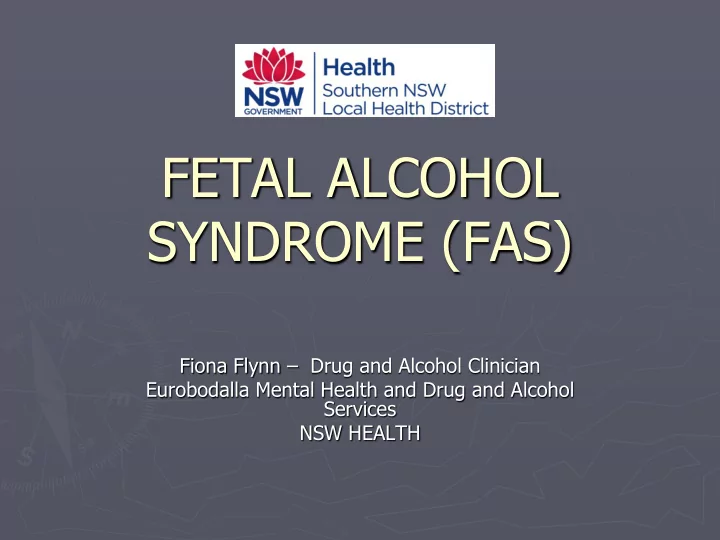

FETAL ALCOHOL SYNDROME (FAS) Fiona Flynn – Drug and Alcohol Clinician Eurobodalla Mental Health and Drug and Alcohol Services NSW HEALTH
“DO NO HARM” It’s very easy for people to think that by ignoring Fetal Alcohol Syndrome you are doing no harm. That is in fact the harm we do!
Terminology In acknowledgment of the continuum of the effects that drinking during pregnancy can cause, unless specially talking about Fetal Alcohol Syndrome (FAS) the term Fetal Alcohol Spectrum disorder (FASd) has been used to encompass the following four conditions: * (FAS) - Fetal Alcohol Syndrome * (FAE) - Fetal Alcohol Effects * (ARND) -Alcohol Related Neuro developmental Disorder * (ARBD) - Alcohol Related Birth Defects
Women who drank alcohol during pregnancy may feel a sense of guilt & shame. Women who drank alcohol during pregnancy were either; ► un-informed ► Mis -informed ► ill & informed Women who drank during pregnancy and gave birth to children with FASD need LEGS to move forward; Listening to Encouragement, Guidance & Support
No single group, organisation, community, department or government can deal effectively with this problem on its own. Broad-based efforts are required, given that this is possibly the most serious and far reaching health problem ever faced by Australians. It affects hundreds of thousands of Australians and we cannot afford to underestimate the devastating impact it has on all sectors of our society.
What causes FAS? ► FAS is considered a consequence of heavy alcohol intake during pregnancy ► FAS is the severe end of spectrum of effects of exposure to alcohol in pregnancy ► >4 standard alcoholic drinks at one time is believed to be more toxic to the foetus than drinking the same amount over several days
National Health and Medical Research Council (NHMRC) Australian Alcohol Guideline 4 Guideline 4 Maternal alcohol consumption can harm the developing foetus or breastfeeding baby. ► A - For women who are pregnant or planning a pregnancy, not drinking is the safest option. ► B - For women who are breastfeeding, not drinking is the safest option NHMRC, 2009
Health professionals practice and opinions about alcohol use in pregnancy ► Health Professionals should: Ask pregnant women about alcohol use in pregnancy Offer advice about drinking alcohol in pregnancy Provide information on the consequences of drinking alcohol in pregnancy.
Assessing Alcohol Use In Pregnancy Research shows that 50% of women have unplanned pregnancies. Most of these women are unaware they are pregnant in the first 4-6 weeks of conception. This is the crucial stage of embryonic brain development. Biomarkers of alcohol exposure: ► GGT ► Carbohydrate Deficient Transferrin ► Mean Corpuscular Volume (MCV) ► Newborn meconium
Prenatal Communication ► Assume the women drinks alcohol until told otherwise ► Focus concern on babe in utero ► Elicit drinking habits before pregnancy. This indicates harm in 1 st 6 weeks of gestation ► Education does make a difference
Phenotype of FAS GROWTH Prenatal growth deficiency Postnatal growth deficiency Microcephaly – small brain and head PERFORMANCE Developmental delay Fine motor dysfunction – jittery in newborn, irritable FACE Short palpebral fissures Long smooth philtrum Thin vermilion border of the upper lip OTHER Cleft palate, Joint anomalies, Altered palmar creases, cardiac defects, maxillary hypoplasia
BEHAVIORAL DYSFUNCTIONS IN CHILDHOOD ► Average IQ full blown FAS 63 however some so low they cant be measured. ► Difficult to Dx at birth however clear at 5 years of age when kindergarten starts. ► Decreased attention span ► Hypoactivity ► Poor school performance ► Lack of boundaries no friends ► No understanding of instructions
Facial Features
The FASD Ice Burg 90% of FASD Children; • Have no physical features of the syndrome • Have IQ’s in the normal range (70 – 130) Invisible but Serious Attention deficits Memory deficits Hyperactivity Difficulty with abstract concepts Poor problem solving skills Difficulty learning from consequences Vulnerable and naive Stunted social development Immature behavior Emotional outbursts Poor impulse control Poor judgment
BEHAVIORIAL DYSFUNSTIONS IN ADULTHOOD Case Study of a 24 Year Old Women ► Dropped out of school early ► Trouble with law ► Problems retaining and getting employment ► Psychiatric admissions ► Psychotic episodes brought on by AOD use ► Sexually assaulted and exploited ► DV survivor ► Physical assaults by ‘friends’
ADD/ADHD V’s FAS Can you tell the difference? ADD/ADHD FASD Have trouble focussing & sustaining focus Can focus & sustain focus When focused, student can learn & problem When focused, has trouble problem solve, etc solving & using newly learned info Student can shift focus when necessary Has difficulty shifting focus May act impulsively without forethought May act impulsively When things go wrong student is able to: When things go wrong student is unable to (or slow) to: • Process • Process • Understand what happened • Solve the problem • Problem solve • Take responsibility Adapted from FAS Times, Summer 1997: Fetal Alcohol Exposure & Attention: Moving Beyond ADHD
Looking at the sweeter side of FAS.. Common strengths of FASD kids ► Highly verbal ► Bright in areas ► Artistic, musical, mechanical ► Athletic ► Friendly, out going, affectionate ► Determined, persistent ► Willing ► Helpful ► Generous
What can we do ??? ► Very few pregnant women ask HP about alcohol use in pregnancy ► Health promotion/education about the effect alcohol may have on the fetus should be readily available to women of childbearing age ► HP should routinely enquire about alcohol use in pregnancy and provide information on the consequences of alcohol use in pregnancy ► NHMRC Alcohol Guideline 4 is not followed in practice
Sample labels developed by the Victorian government
Wallet cards
South Africa labels
SUMMARY ► Co-ordinated national approach. ► Research – drinking patterns in pregnancy ► Education ► Action – diagnoses in high risk communities ► Public health initiatives
The World Health Organization states that currently there is no evidence of a “safe” dose of alcohol at any time during pregnancy
Recommend
More recommend